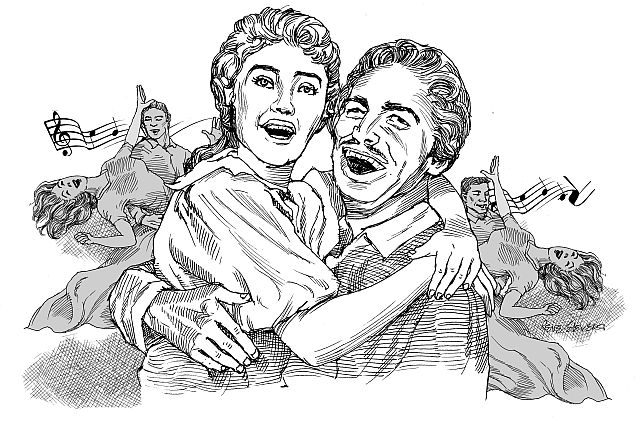I remember a movie, “Seven Brides for Seven Brothers,” which came out sixty-two years ago (I saw it much later, in case you’re now doing the math). Many regard it as one of the best American musical films ever made, and I agree — the rousing dance numbers alone have remained with me ever since.
The writers based the screenplay on Stephen Vincent Benét’s “The Sobbin’ Women,” a parody of an ancient Roman legend popularly known as “The Rape of the Sabine Women.” (“Rape” does not mean sexual violation, being merely a translation of the Latin “raptio,” which denotes abduction. The story goes that, in ancient Rome, the men, in search of wives to start their families, unsuccessfully negotiated with the neighboring Sabines, who prohibited their women from marrying the Romans. The latter arranged a festival during which they abducted the Sabine women, who eventually became their wives. When the
Sabines declared war against Rome, the women threw themselves between the contending forces, amid the flying spears and arrows, effectively stopping the battle.
The movie tells of the seven Pontipee brothers, backwoodsmen in Oregon. When one of them, Adam, brought Milly home as wife, the brothers likewise wanted to get themselves spouses in her mold. At a barn raising, they met six women whom they fancied, and who felt a liking for them as well, except that they already had suitors, who challenged the Pontipee brothers to a fight. At first, having been instructed by Milly in civility, they refused the challenge, but, when the suitors attacked Adam, they eventually entered the fray, successfully overpowering their rivals. As a result, the Pontipees were banished from the town.
Missing the girls so much, the brothers abducted them, blocking their pursuers with an avalanche. Unfortunately, they forgot to bring the parson who could marry them. This angered Milly and the six women, whom Milly had taken to live in the house, and she ordered Adam and his six brothers to keep away and stay in the barn. In time, however, the girls learned to love the brothers, and Milly gave birth to a daughter, Hannah.
Eventually, the townspeople showed up, intending to lynch the Pontipee brothers for abducting the women. When the father of one of them, a pastor, heard a baby cry, he asked them whose child it was. The women simultaneously decided that each of them should claim the baby as her own. This impelled the townspeople to have the pastor marry all six couples, the fathers of the girls standing behind their grooms, holding their shotguns.
In his Gospel, Luke reversed the picture and wrote about a tricky matter involving seven husbands of just one woman. The Sadducees, who did not believe in the Resurrection, reminded Jesus of the Mosaic requirement that, “if a man’s brother dies and leaves a wife but no children, the man must marry the widow and raise up offspring for his brother.” Then, using reductio ad absurdum, they posited the situation of a woman whose husband died childless, and whom the other brothers, one after the other, took as wife, and likewise they, all of them, died without any children. The Sadducees asked Jesus, “Now then, at the resurrection, whose wife will she be, since the seven were married to her?”
Instead of directly answering the Sadducees’ argument, Jesus attacked its premise, “The people of this age marry and are given in marriage. But those who are considered worthy of taking part in the age to come and in the resurrection from the dead will neither marry nor be given in marriage, and they can no longer die; for they are like the angels.”
The Sadducees presumed that the resurrected life did not differ from the earthly. And so Jesus put them in mind of the real score, that at the resurrection people would not be living worldly lives: eating and drinking and marrying and being given in marriage.
In fact, in the other life the Pontipee brothers would not identify themselves as such as much as brothers of Christ and children of God. And, while there would be no need for the men and women to be paired, because the gaze of all is turned towards God and not towards one another, there would still be celebration, the wedding banquet of the Lamb, in which, I’m sure, there would be dances, a choreography more lively and exhilarating than that in “Seven Brides for Seven Brothers,” with such marvelous acrobatics as only those who have become like angels are capable.
Disclaimer: The comments uploaded on this site do not necessarily represent or reflect the views of management and owner of Cebudailynews. We reserve the right to exclude comments that we deem to be inconsistent with our editorial standards.

